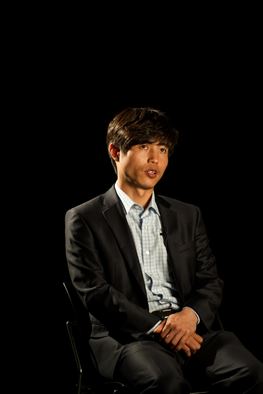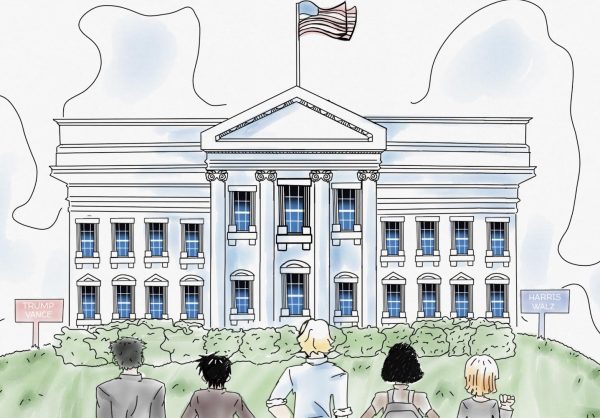North Korea: a Nation Founded by Fear
His outer left eye is marked with a scar from a stone that hit him at age 11. The tip of his right middle finger is cut off as punishment for dropping a sewing machine. The marks on his shins, ankles and lower back are reminders of the electric barbed wire fence that he climbed through to escape.
His name is Shin Dong-hyuk, and his medical records fall short of his full experience in the North Korean labor camp for political prisoners where he was born and raised.
Six thousand miles from America, children in North Korean camps are raised through beatings, starvation and learning survival skills before knowing the capacity to love, a concept that Shin could not grasp until he lived in America years after his escape.
Even as personal accounts surface of the cruelty of the North Korean government, the world’s leading nations turn a blind eye and cut ties to the country. It is easier to ignore the facts and live in ignorant peace, believing that North Koreans are considered enemies, but no, an unjust government does not reflect the character of the people who are raised there and forced to conform to that society.
One of the most well-known escapees from North Korea is Dong-hyuk, who is the only known person to be born in and successfully escape a labor camp.
According to Human Rights Watch, he suffered beatings and torture for the crimes of his parents. In his personal account, which he disclosed with journalist Blaine Harden, he described human relationships as they are in the camps.

Shin Dong-hyuk, human rights activist, speaks with American Forces Network Kunsan before sharing his story with the rest of the Wolf Pack at Kunsan Air Base, Republic of Korea, Apr. 25, 2014. Shin was born and raised in a North Korean political prisoner camp.
“His mother beat him, and he viewed her as a competitor for food,” Harden wrote in his book Escape From Camp 14. “His father […] was a stranger. Children in the camp were untrustworthy and abusive. Before he learned anything else, Shin learned to survive by snitching on all of them.”
Dong-hyuk himself admitted that he was more faithful to guards than to his own family.
As Harden reports, in the camps, prisoners were rewarded if they betrayed a peer or parent. This was essential for Dong-hyuk, who saw his mother, with whom he lived until he was 12, as competition for survival. Even in normal North Korean towns, children are taught to report on their parents to town officials. American media often portrays North Koreans as insensitive, corrupt civilians. In reality, the government has shaped them to appear this way, while really, they are driven by fear.
Families in the labor camps often turn on one another in exchange for more food and small freedoms. This contradicts typical Eastern cultural values, which emphasize relationships and community goals, an idea argued by Alana Conner and Hazel Rose Markus in their book Clash!: How to Thrive in a Multicultural World. However, in the North Korean camps, prisoners must be selfish, because deception may mean life or death. The prisoners have no one to turn to and must only trust themselves. Blood means nothing, especially when the guards view genetics as poison, linking a parents’ crime to the innocent child. No child should have to live life fighting for another day, not even if they are born into a society that gives its children an “anti-American education,” as said by Eric Lafforgue’s tour guide during one of his six visits to the country.
As sad as the stories are, there is no simple solution.
Several countries have slowly pulled away from their deals with North Korea and no longer provide aid. According to Harden’s report, two thirds of North Koreans are malnourished. This is because of the impoverished North Korean government not being financially stable enough to support farm life or buy from foreign markets. Russia stopped assisting the country with oil for their factories, and South Korea ended the “Sunshine Policy,” which supplied the North with half a million tons of fertilizer per year. The Central Intelligence Agency reports that the only countries that trade with North Korea are China and Republic of the Congo. In order for North Korea to receive foreign aid from countries like America, officials must be sent in to survey the land and people to determine the extent of need. However, the country is currently receiving no help. This is likely leader Kim Jong Un’s choice, but the personal accounts of starvation are chilling nonetheless.
The Washington Post states that the famine of the 1990s was a daunting time for civilians, who told their children to never go out alone. This was meant to prevent them from becoming victims of cannibalism. Harden’s book briefly describes the phenomenon.
“During the famine, train station cleaning staff made rounds with a wooden handcart, collecting bodies from the station floor,” Harden wrote. “There were widespread rumors of cannibalism, with claims that some children hanging around the station were drugged, killed and butchered for meat.”
The claims are rare, but still the North Korean government will not confirm or deny the alleged cases.
Some may say that hardship builds moral character, but denial of basic human rights causes people to turn to their worst selves. A corrupt and selfish government creates selfish people, but I do not resent them for how they survive. It is hard to blame victims for their choices, knowing that if it wasn’t for the economic situation in North Korea, those people might be living a decent life.
North Korea’s government refuses help, making it hard for other countries to provide aid without overstepping any boundaries. This creates a broken class system, where if one is not a high-ranking member of the military, then they are left with the dogs (which were mostly eaten during the famine). The world’s leading governments turn a blind eye to the treatment of North Koreans, but in the labor camps, which have been around for 70 years according to freekorea.us, conditions are often worse than they were in Holocaust camps, which are frequently condemned.
When given the opportunity, many families pay their way out of North Korea. I will never fully understand the experiences of North Korean prisoners, or the average citizen, but I understand why selfish motivations are often a necessity. I look nothing like them, but just like me, they wish for freedom and a happy life.
We may not be able to directly help, but we can adjust our mindset. Trying to understand the experiences of those living under foreign governments different from ours may open our minds and hearts to other upbringings, circumstances and lifestyles we do not understand, making it easier to reduce prejudice.




